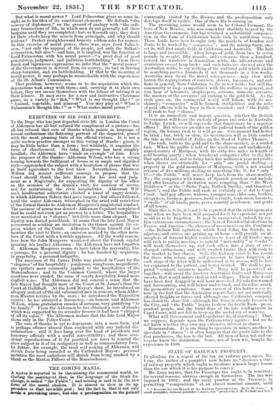EXECTTION OF SIR JOHN MUSGROVE.
To the Doge who has just departed civic life in London -the Court of Aldermen has all but refused the compliment of a picture—has all but refused that vote of thanks which paints in language of forinaLentimsiasm the flattering portrait of -the 'departed, graced with the most ,pkasing tints of his official virtues. It is not a quite useless practice amongst us this voting of thanks : given, it may be little better than a form ; but withheld, it acquires the force of chastisement. Sir John Musgrove has been roughly handled; the Aldermen have "made an example" of him. Even the proposer of the thanks—Alderman Wilson, who has a strong leaning towards the -fulfilment of forms in an erarde and -dignified Atyle—approached the subject with.a hesitation -of phrase that was in itself equivalent to the first blow- Nevertheless, Alderman Wilson did muster sufficient courage to propose that the Court _should thank the late Mayor for his seal and judg- ment as a Magistrate, -for supporting the dignity of his office -on the oecasion -of the Queen's visit, for easiness of access, and for maintaining the civic hospitalities. Alderman Wil- 13011'S kindhearted solicitation elicited a burst of angry denials, to which Alderman Sidney first gave -tongue ; but others followed, until the senior Alderman triumphed in the cruel-cold restriction of the formal thanks to Alderman Musgrove's magisterial conduct. The easiness of access was denied: Alderman Copeland complained that he could not even get an answer to a letter. The hospitalities were mentioned as "elegant," but little more than elegant. The dignity was denied pointblank. It seems that the late Lord Mayor persevered in sending an invitation to the Queen against the ex- press -wishes of the-Court. Alderman Wilson himself did not mention the visit to Paris ; an omission marked by the other mem- bers of the Court with a terrible applause. All the world -remem- bers how Sir John Musgrove wandered about the French capital ignoring his brother Aldermen : the Aldermen have not forgotten it. Alderman Musgrove seems to have taken the mayoralty, like a peerage, for a personal dignity : he has finished by acquiring, in perpetuity, a personal indignity. The successor of Sir Tames Duke was praised in Court for the " elegance" of his hospitality : ponderous, sumptuous, magnificent, are epithets more commonly applied to the hospitalities of the Mansionhouse ; and in the Common Council, where the larger questions were evaded, the sense of scanty hospitality found more explicit -rake. 'The Aldermen did not conceal a sense that the late Mayor had thought more of the Court at St. James's than the Court at Guildhall. At the Lord Mayor's show, he introduced an allegory instead of the old substantial men in armour, whom Alder- man Hunter revives by the score : he introduced the Exposition soirees : he has obtained a Baronetcy,—an honour, said Alderman Wilson, whose gratulation smacks of sarcasm, very gratifying "to his family." From the Aldermen he has.obtained a vote of thanks which-was supported by its seconder because it had been "stripped of all its value. The Aldermen declare that the late Lord Mayor shcme only in the Police Court. The vote of thanks is apt to degenerate into a mere form, and is perhaps oftener abused than employed with any judicial dis- crimination : still it does hang over the head of presidents and honorary officials -with a useful convertibility; and these occa- sional reproductions of it for practical use serve to remind the class subject to it of its castigatory as well as conunendatory force. In future, for example, the most self-seeking of Aldermen will shrink from being recorded as the Unthanked Mayor ; personal ambition the most audabions will shrink from baing marked by a blank as the Mariiio Faliero of the Mansionlionse.


























 Previous page
Previous page